Given the Trump Administration’s Executive Order that aims to revoke visas to nationals from seven Muslim-majority nations, what is your professional society doing to further support conference travel to the USA?
This post shares a personal example, before providing background context about the Executive Order, how scientists have responded, and what research organisations may need to consider in terms of academic conferences.
The ‘Muslim Ban’
Whilst campaigning for the Presidency, Donald Trump had promised various policy changes pandering to xenophobia, including a “Muslim register” as well as travel restrictions under the guise of national security. By the 27 January 2017, just one week after taking office, President Trump delivered on his much-publicised promise to target Muslim Americans. He signed his Executive Order to place a 90-day block on nationals from seven Muslim-majority nations: Iran, Iraq, Libya, Somalia, Sudan, Syria and Yemen. Massive deportations occurred immediately and “the Muslim ban” created massive chaos. Sixty thousand visas were revoked immediately that weekend. It cannot be underestimated the massive impact on Muslims and their families who were kept from entering the USA, some of whom were locked in detention facilities. At least one woman died after being denied entry back into the USA.
Social protests followed immediately, along with demonstrable action by lawyers volunteering on the ground to bring back those who were stranded overseas and deported. A groundbreaking lawsuit against President Trump was set in motion.
Academics were among those affected, including data scientist Nazanin Zinouri. Millions of academics around the world had already joined related protests against Trump. Beyond, many academics took a public stance against the Muslim ban’s impact on academic science. They shared the personal and political impact on their professional careers. This especially affects scientists born in Iran. Esteemed colleagues spoke out about the moral duty of scientists to take action against the USA Government. To date, over 42,000 American academics have signed the petition against the immigration restriction, including 30,000 faculty in the USA, 62 Nobel Laureates, 105 prestigious Prize awardees, and 813 Members of the National Academies of Sciences, Engineering, Arts. Over 150 American scientific organisations have signed an open letter to Trump opposing his Executive Order. Scientists offered desk space, accommodation and support to other researchers via the Science Solidarity List. The Muslim ban is one of many reasons why scientists from underrepresented backgrounds, including me, continue to advocate that the global March for Science should take a stronger stance on diversity issues.
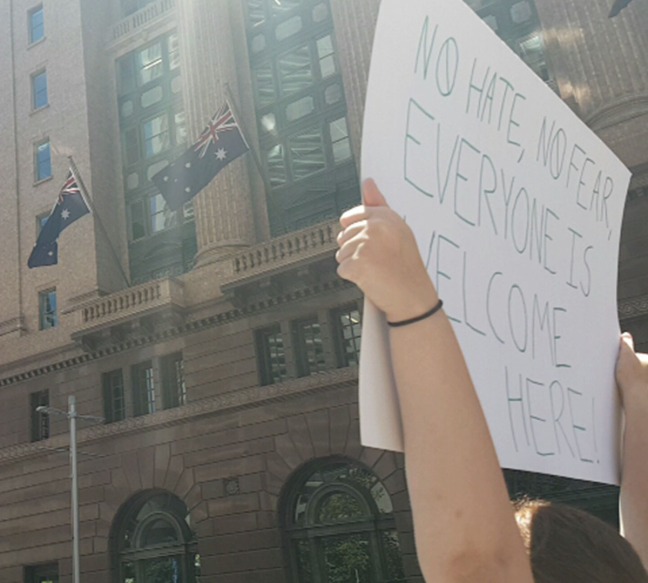
Islamophobia has been ongoing in Australia for many decades. The Muslim ban is an extension of long-held prejudices that impact the daily lives of Muslim-Australians, the USA, and elsewhere. Our own policies are no better. Mandatory offshore detention of refugees exclusively targets Muslims and has been our official national policy since 2001. We are set to enforce a permanent ban on boat arrivals unless we do something about it. Still, Australians are invested in protesting the Muslim ban, with both Australian-Muslim organisations and a public petition issuing pleas to our leaders to formally oppose President Trump’s ban.
Visa processing delays
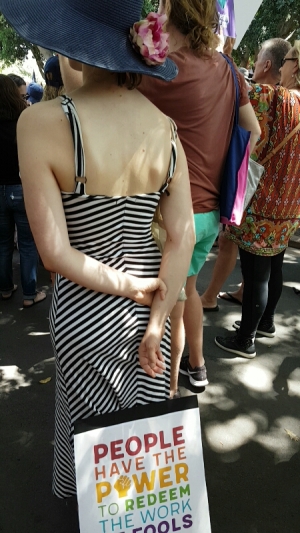
Regardless the stay means the ban should not be enforced. That did not stop a young Australian-Iranian boy from being denied entry to the USA to attend space camp in the early confusion of the ban. It also hasn’t stopped a Canada-born Muslim youth being turned away at the border just yesterday under unclear circumstances. He was travelling with his teammates for a university sports tournament.
I was impacted by the ban, but in a minor way in comparison to Muslim colleagues.
This is my story as a non-Muslim Australian. I’m sharing it as a minor example of the confusion and possible ramifications of the “Muslim ban” on academics. The broader context is much more perilous for Muslims who have a concrete fear for their future under President Trump.
I was invited to speak at a conference in honour of the International Day of Women and Girls in Science. The event, Gender, Science and Sustainable Development: The Impact of Media – From Vision to Action, was held on February 10th, 2017 at the United Nations Headquarters in New York City, USA. I was invited to discuss my public writing on women in science.
In preparation for this travel, I applied for the visa waiver program in January, as is my right as an Australian citizen (I do not have dual citizenship). This program should provide automatic approval for people holding an electronic Australian passport. I received an automatic message when I applied that I was not auto approved but that I’d hear an outcome within 72 hours, as is the maximum waiting period for this service. The time came and went and there was no response. I have not been denied a visa, I have simply not been granted one and not given a reason.
After a few enquiries, I received a message saying it would be at least three months before I would get a decision on my application. I called the the USA visa office in Australia. I was told to contact the USA Homeland Security and given a USA phone number. By then, the Trump administration’s Executive Order was in full effect.
As academic friends have pointed out, President Trump has disbanded key roles that may be affecting how administrative offices are being managed and resourced, perhaps including those overseeing visa processing.
The Trump government is currently conducting an unprecedented campaign to deport undocumented migrants that goes beyond the Obama Administration’s callous tactics. Perhaps this also impacts processing of short-term visa applications.
[Update: a few days after going public with this story, which especially received a lot of attention on Twitter and Google+, I received an email saying that my visa waiver was approved. It came one month after I’d initially applied, and too late to attend the United Nations conference.]
How might the ban affect other scholars, and what can professional associations do to intervene?
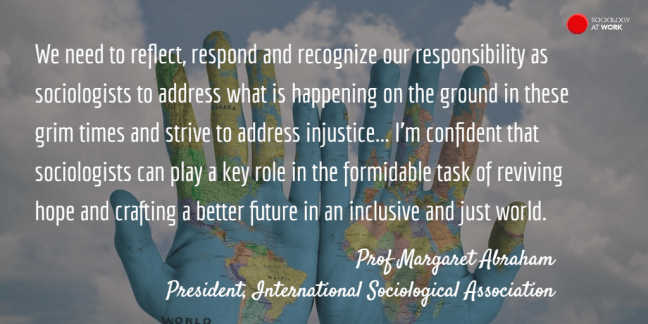
What are sociological associations doing?
The ‘Muslim ban’ presents sustained challenges. Organisations must be proactive. Academic conferences are one of the primary activities of professional organisations. I have previously discussed the importance of academic conferences to early career researchers. Educators have an ethical imperative to take visible action on the Muslim ban, which creates additional stress and hostility especially for students. What is happening in my discipline to prevent visa hold ups for researchers?
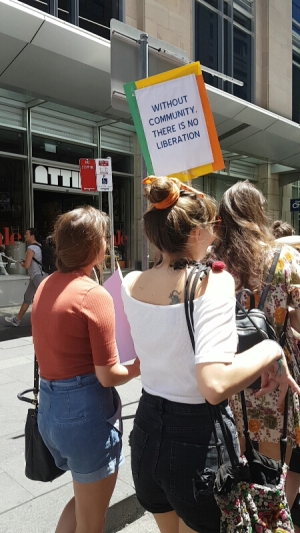
There is a critical need for us individually, as sociologists, and collectively, as an association, to listen and understand the voice and actions of multiple publics across the world; not to dismiss but to discuss, to actively engage in dialogue and debate; to examine and address the issues of inequality and injustices that are at the root of the ethnocentrism, xenophobia, and extreme right-wing thinking on the rise. We need to reflect, respond and recognise our responsibility as sociologists to address what is happening on the ground in these grim times and strive to address injustices. I am writing this at the outset because, despite the multiple challenges we currently confront, I continue to believe in reason and I’m confident that sociologists can play a key role in the formidable task of reviving hope and crafting a better future in an inclusive and just world.
The American Sociological Association has taken a number of important steps to support their members and have asked for further suggestions. The ASA writes:
As sociologists, we oppose this Executive Order because it affects our colleagues and students as well as the conditions for knowledge production. In addition, sociologists have documented and analysed the ways in which symbolic boundaries are made more rigid and result in the social exclusion of specific groups. This Executive Order targeting specific groups of individuals has effects not only on its immediate victims, but also on how our society understands itself and its orientation toward diversity and human rights…
We are also working with several coalitions of scientific and humanistic disciplinary societies to defend the fundamental principles of academic scholarship and the use of empirical evidence in support of public policy. This is especially important at a time when “alternative facts” are offered as “evidence” in regard to challenges to scientific consensus on climate change and other policy issues. We are working with these coalitions to develop immediate and long-term strategies to address issues such as access to data essential to the study of racial discrimination and other forms of inequality and exclusion.
Here are the steps the ASA has taken so far, as outlined in their statement:
- The ASA is taking “a firm stance” against last week’s Executive Order. They have co-signed the statement by the American Association for the Advancement of Science.
- The ASA is actively monitoring the upcoming ASA Annual Meeting in Montreal and looking for ways to address issues.
- The ASA asks sociologists to report to them threats to academic freedom and expertise and to the professional lives of sociologists. Contact ASA Executive Director Nancy Kidd, nkidd@asanet.org.
- The ASA asks experts “in particular areas that are threatened by current and future public policy decisions” to contact them, to better coordinate responses.
- The ASA asks its members: “please be prepared to respond to calls for action.” For example:
- Sign the Academics Against Immigration Executive Order
- Participate in the March for Science, endorsed by the ASA.
This is a good model to build on. The visa issue still needs proactive advocacy and tangible support for researchers as it is a legal barrier that is highly taxing and difficult to navigate. I hope that The Australian Sociological Association may publicise its stance and consider forms of visa support to scholars who may be potentially affected by the ban. While they cater to a national membership, we belong to an international tradition, and our Muslim colleagues here and overseas could use the support.
Resources
Follow media updates on the executive order impact on dual nationals from Australia.
Images
All images by Zuleyka Zevallos.
- Header: among a group of protesters at the Women’s March Sydney, a woman holds the sign that reads: Trump Uphold Human Rights for All.
- A woman holds up sign with the Australian flag visible in the background. Message reads: No hate no fear, everyone is welcome here.
- In a crowd of standing protesters facing front, a woman holds sign low behind her back. It reads: People have the power to redeem the work of fools.
- Two open palms are painted like a world atlas, with the ISA quote as above: “We need to reflect… an inclusive and just world.” Quote: International Sociological Association. Image: Sociology at Work.
- Women protesters are walking through Sydney CBD. One of the sign reads: Without community there is no liberation.

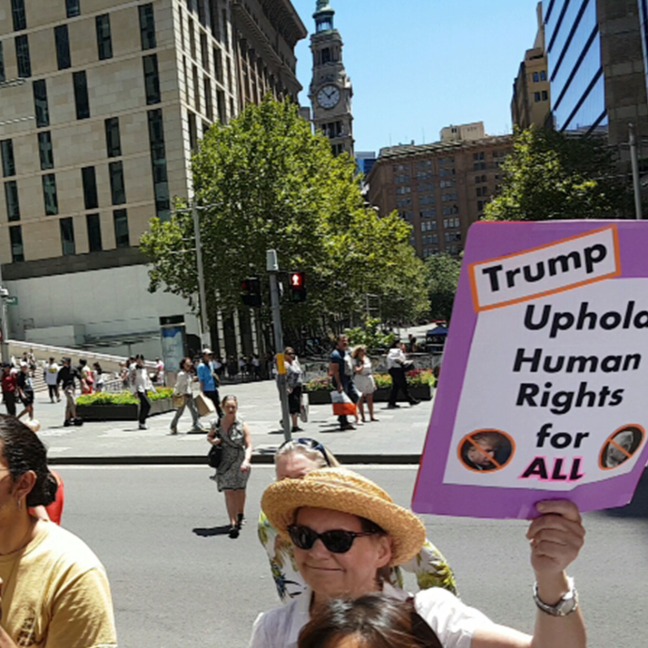

I find it ironic that people keep saying “Muslim ban” when Muslims are STILL ALLOWED TO COME HERE and when I ask the person about their misconception they have ABSOLUTELY NO RESPONSE THAT RESEMBLES REALITY.
Odd. I contribute it to ignorance, retardedness, hatred of Trump, hatred of reality, or a simple bias to facts.
So…What’s your excuse?
LikeLike
Johnnyland Search and Rescue Your comments violate my commenting policy and those of Google. You’re using hate speech, you’re swearing and abusing other people, and most of all you’re completely off topic.
I’ll be removing most, if not all, of your comments. You’re not really here to have a conversation. You’re just motivated by racism.
I have worked in counterterrorism research. My studies on terrorism and political violence are open source. The figures you’ve cited on terrorism are incorrect. But this post isn’t about terrorism or hatred of Muslims.
The answer why academics don’t use technology to attend conferences – we do. Some conferences are simply conducted face to face to facilitate a different mode of interaction and networking.
LikeLike
And just cause I don’t know…If Muslims are in so much fear under a Trump presidency why would they want to come? And why are they so intent on leaving their homeland? To come to a place their afraid to be?
LikeLike
I would also like to know how many articles you wrote on the previous president, the “deporter in chief” as he was dubbed, simply because he deported MORE illegal immigrants than any other president in history… Estimated at 2.5 million.
LikeLike
Additionally, when “scholars” complain about being held up from traveling internationally and missing some conference or meeting I kind of giggle and wonder if they ever heard of Skype or conference calls or video chat or any of the other ways to communicate in the 21st century.
LikeLike
Then I wonder just exactly what someone from Australia knows about the actual facts on illegal immigration in this country…Compared to…Oh…Say someone like me who lives in Texas close to the border and is in construction and has never voted, cause, well, I’m not retarded. Voting for the lesser of two evils is still voting for evil. 😀
LikeLike
I wonder if you have a full grasp on the direction Islamic terrorism is headed and how much research you have done with the subject or how much you believe in a countries sovereignity and it’s right to protect its own citizens at the “discomfort” of someone having to ONLY WAIT to come here…
LikeLike
And just out of curiosity since you seem to be so concerned with how Muslims feel how do you feel about Americans not wanting to allow terrorists into our country? I only live a couple hours away from Garland Texas we’re just last year and Muslim terrorist was shot and killed as he attempted to murder as many people as he could. Thankfully a cop put a couple pieces of lead in his skull.
There are approximately 1.6 billion Muslims on the planet with an estimated 3℅ to 5℅ of them being terrorists. I’m not good at math…Could you tell me how many Muslim terrorists that comes out to be? What’s 5℅ of 1.6 billion?
And what would your ideas be on how to stop them?
LikeLike
One last thing, make sure you are aware of your biases before you answer…Only because I don’t know you and I’ve already found several.
I look forward to your reply.
LikeLike
There is no muslim ban, you are a shrill
LikeLike
everyone is welcome here, just as long as they’re go to the proper vetting procedure.
LikeLike
The ban on people from the UK going to the US to live and work has been a lot longer and NO one gave a toss back then ?????????? Also Obama and others did the same ban and were called hero’s of the US ????????????????????
LikeLike
Richard Maunder There is no “ban” on UK people going to the USA. No one here has called Obama a hero for his immigration policies. These aren’t the concern of this post.
LikeLike
American Visa is A PRIVILEGE NOT A GAURENTED RIGHT. you are Not an American Citizen so I dont expect you to understand, but Our Country needs to be restructured, we are Closed due to remodeling. I Value and Respect your legal attempt to come to America, And if your purpose is to become and or contribute to America I hope once America has its best protocol in place for Americans you will be approved. Great things come to thoes who work hard and have goals and reach for their goals. God Bless and good Luck And May GOD BLESS AMERICA AND PRESIDENT TRUMP AND ALL AMERICANS!!!! until then maybe you should strive to improve the country YOU live in, maybe then one day people will want to immigrate there, or maybe move to a third world country and help out people/Men/Women/Children who are really oppressed.
LikeLike
Stefan Molnapor Australia is home to the sixth largest populations of Americans in the world. Australia and the USA have shared a strong political alliance for many decades, which one of the reasons why the visa waiver program exists for Australians wishing to travel to the USA. The post clearly says the visa was for a temporary trip for a conference.
The point here is that, as 151 scientific organisations and over 40,000 scientists have attested, the Executive Order threatens scientific collaboration, research activities and the wellbeing of scientists.
LikeLike
You continue to refer throughout this blog as a “Muslim ban” when no mention of Islam is made in the orders. You assume incorrectly it’s a ban on Muslims because the 7 nations are majority Muslim. Nations where Islam has some of the largest populations are not on this list like Saudi Arabia and Indonesia.
No one is banned as if they are permanently barred from ever entering the U.S.
I’m afraid your concern that Muslims have much to fear under a Trump administration is with all due respect sensationalistic. Why is it that Muslims still seek to enter the U.S.?
While many aspects of the order were clumsily written and the execution equally so there is good solid reasons for the careful vetting of people from the nations listed.
As a Hispanic who was born in the U.S and whose mother is from South America and a Mexican born father I have not felt any fear from this administration. There are no grounds for fear either for me or Muslims expect imagined ones.
LikeLike
Hi Javier. I’ve linked to resources where lawyers discuss their legal opposition to the Muslim ban, and referenced the fact that the ban involves a 90-day block on visas. I’ve also linked to extensive sources that discuss why and how this has already affected the lives of Muslims, as well as the impact on the scientific and broader academic sectors. It is a Muslim ban because President Trump because it targets Muslim majority countries, selecting nations to which his company has no strong ties. The President has also qualified that Christians from the seven nations on the list might be exempt.
The fact that you do not feel a connection to this issue has no bearing on the 60,000 people who were immediately affected, and everyone else who may be potentially affected in future.
LikeLike
The radical world must be delighted USA is tearing itself apart with the help of Trump the master of hate and division
LikeLike
I’ve removed the most abusive and off-topic comments, leaving only some to represent why this thread went in a poor direction. This includes Iddih Jarabbi and Johnnyland, who exchanged racist and personal attacks in over 200 comments. A science thread is no place for this inexcusable behaviour and neither is Google+ frankly.
The same goes for other people. This isn’t a post that gives a platform to racism or personal politics. This is a discussion about what scientific societies can do to address visa confusion and problems for academic conferences as the Executive Order is on a stay and is still causing many issues for scientists.
My post will be closed overnight and while I am away. My threads are moderated for a reason: to keep discussions focused and civil. Also note that I write using credible and scientific sources and ask that people do the same if they want to dispute the scientific sources in my posts.
I ask that people stick to my commenting guidelines: 1) discuss sociology (you’re on my sociology collection after all); 2) be polite; 3) stay on topic; and 4) be aware of your own biases. Have a look at my About section for more details on my commenting policy.
Take care and speak to you later.
LikeLike